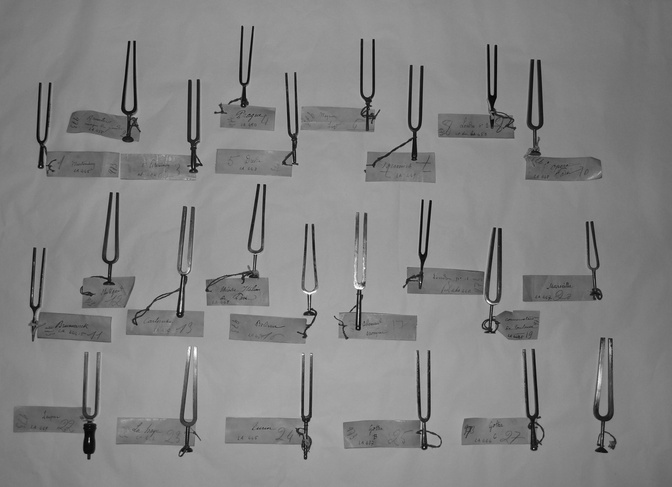La détermination d’une mesure unifiée pour la musique a été l’objet de nombreux débats, au centre d’intenses négociations entre pays et domaines d’expertise. Reflets de l’importance de ces échanges et de ces pratiques, des archives et collections à travers le monde conservent une riche documentation remontant au début du XIXe siècle, qui permet de reconstituer les conversations et les pratiques qui ont mené à l’adoption du ton du diapason la 440 lors d’une conférence internationale organisée à Londres en 1939. Pour l’essentiel, ces sources sont demeurées inexplorées et aucune étude n’a jusqu’ici éclairé la création de cette mesure. Alors que les historiens des sciences ont montré le caractère conventionnel des standards, en analysant les contingences historiques de leur production, l’histoire du la 440 n’a pas retenu l’attention des chercheurs, et apparaît souvent comme une pratique avantageuse, et allant de soi.

À partir d’un travail d’archive intensif, Fanny Gribenski vise à mettre en lumière le versant musical des efforts déployés pour ordonner les phénomènes naturels et examine la construction d’un point de référence sonore pour le monde occidental. Tuning the World est le titre provisoire de la monographie qui présentera les résultats de plusieurs années de recherche sur cette question. À partir d’une combinaison de perspectives issues de la musicologie, des sound studies, de l’histoire transnationale, et des études de sciences, ce livre offrira un prolongement sonore aux travaux sur l’histoire des standards scientifiques et techniques, et mettra en évidence les champs d’expertise et les acteurs impliqués dans la détermination de la 440, ainsi que les outils, stratégies et politiques déployées pour mesurer, contrôler et réguler les fréquences sonores.
Cette recherche explore plusieurs questions importantes : pourquoi la standardisation du diapason est-elle devenue un sujet de préoccupation au début du XIXe siècle ? Quels sont les acteurs et les pays qui furent investis d’une autorité pendant les négociations ? Et quelles sont les procédures qui ont gouverné l’adoption de ce standard. En répondant à ces questions, ce projet démontre les contingences qui ont sous-tendu la construction historique du diapason de concert la 440 et trace les réseaux qui se sont littéralement efforcés d’accorder le monde.
Équipe Ircam : Analyse des pratiques musicales


